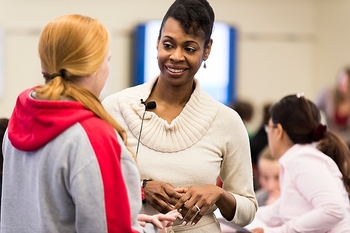When Earlise Ward came to UW-Madison, the Brooklyn, New York, native figured she would return home once she had her Ph.D to work as a psychologist.
But then Ward thought about where she could do the most good. There were many people of color working as psychologists in New York, said Ward, who is black, but no African-American psychologists licensed in Dane County at that time.
Ward also thought about a galvanizing memory from when she was a student — she had met an older black woman on a Metro Transit bus who described suffering from depression but feeling turned off by the doctors she had seen locally.
Today, Ward is a licensed psychologist and a professor in the UW-Madison School of Nursing, where she studies attitudes about and treatment of mental illness. Her research puts an emphasis on the perspectives and experiences of its participants, and she particularly focuses on how depression affects older black women — like the person she met on the bus as a student.
For the past five years, Ward organized group counseling courses on depression for black women in Madison and later Milwaukee called Oh Happy Day.
Now, she is working with local black clergy through Dane County’s African-American Council of Churches to develop a new series of classes that incorporate faith-based organizations to build awareness of depression among black women age 50 and older and to improve how they cope with the illness.
The classes, which Ward plans to start in November, are supported by a $120,000 grant from the Ira and Ineva Reilly Baldwin Wisconsin Idea Endowment at UW-Madison.

What was the need you saw for a person from your background to provide mental health services?
There were very few of us professionally trained to do this work, and to do this work with that population. As you think about health disparities, African-Americans are experiencing depression at the same rate as Caucasians, but … they are not seeking mental health services at the rate they’re experiencing those issues. They are suffering in silence.
What I tell people when I talk in the community is, “(Depression) is an illness, it’s not any different from other health conditions. And why is it not any different? Because if it goes untreated, people can actually die.”
What have you learned from your research about how to better address mental health needs in black communities?
There is certainly an openness to group counseling, because that helps to normalize the mental illness and to recognize, “I’m not the only one — there are other people like me who are struggling with these issues and it’s OK to get help.”
What is the potential you see for churches to be involved in improving mental health?
In our earlier work, we learned from our research participants that their primary mode of coping is religious coping. One participant said, “Well, the first thing I do is pray.”
Through the years, I’ve forged relations with the pastors … They were the ones who said, “You know, Dr. Ward, we have folks coming to us with issues that are not spiritual — we think it might be mental health issues, but we’re not trained in mental illness … I don’t have the skills to help these folks, can I refer them to you?”
There certainly is a need to think about how we can partner and develop a faith-based awareness program where we will target the people in the churches so that they have a better understanding — and when the time comes and they’re needing help, they will be more open to seeking help.
— “Know Your Madisonian” Interview by Nico Savidge, Madison.com/Wisconsin State Journal